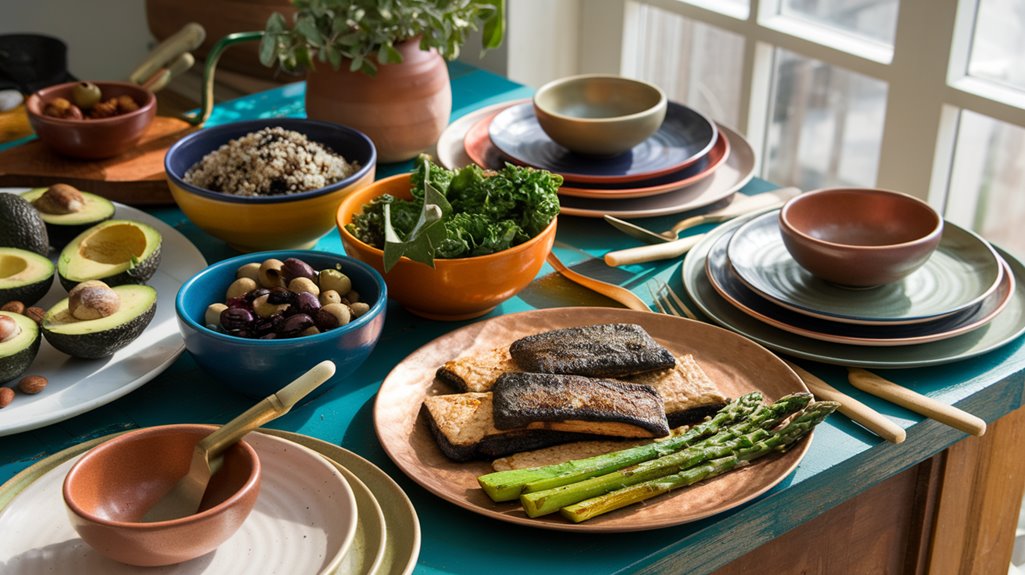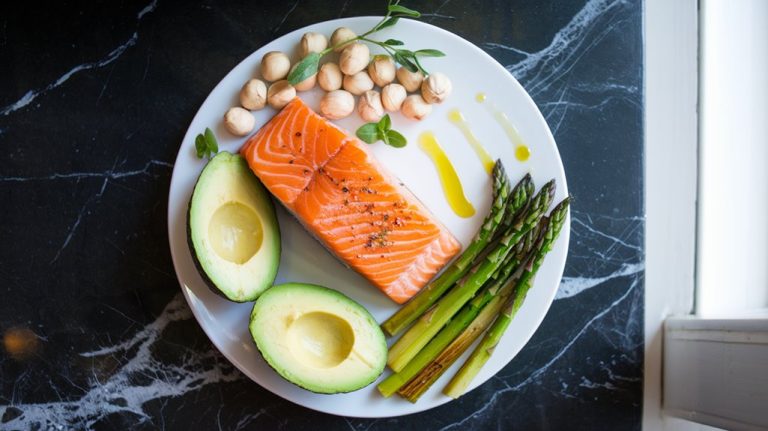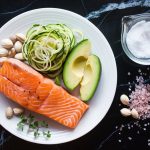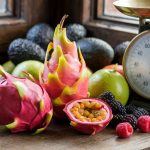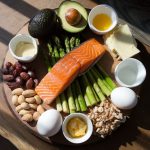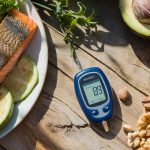You'll find success with Vegan Keto 2.0, a scientifically-validated approach that allows up to 20% carbohydrates while maintaining ketosis through plant-based fats and proteins. The diet emphasizes nutrient-dense foods with a 70% fat, 25% protein, and 5% carb macro ratio, triggering beneficial immune responses within two weeks. You'll need B12, vitamin D, and algae-based omega-3 supplements to meet nutritional needs. Studies show plant-based dieters lose 9.3 pounds more than non-plant-based groups, with documented cases of 50-pound reductions. The complete framework reveals how to optimize your shift.
Keto Highlights
- Vegan Keto 2.0 allows up to 20% calories from carbs, making it more sustainable than traditional keto's strict 5% limit.
- Focus on plant-based fats from avocados, nuts, and seeds while maintaining a 70% fat, 25% protein, 5% carb ratio.
- Essential supplements include vitamin B12, vitamin D, and algae-based omega-3s to prevent common vegan nutrient deficiencies.
- Structure meals around leafy greens and non-starchy vegetables, incorporating protein-rich foods like tempeh and seitan.
- Research shows plant-based dieters lose more weight and experience improved metabolic markers compared to non-plant-based groups.
Understanding the Vegan Keto 2.0 Revolution
As plant-based diets continue gaining momentum, Vegan Keto 2.0 has emerged as a groundbreaking evolution of traditional ketogenic principles. This modified approach allows you to consume up to 20% of calories from carbohydrates while maintaining a fat intake of 50% and protein at 20-30% of total calories.
You'll find this version emphasizes nutrient-dense plant foods while reducing reliance on saturated fats typically found in animal products. Research shows the diet triggers both innate immune responses and adaptive immunity pathways within two weeks, while promoting beneficial changes in gut microbiome composition.
While you may not consistently achieve ketosis due to the higher carbohydrate allowance, you'll benefit from increased dietary flexibility and improved nutrient diversity. However, you'll need to carefully plan your meals and consider supplementation to prevent deficiencies in B12, iron, and omega-3s.
Essential Foods and Meal Planning Strategies
While shifting to a vegan keto lifestyle requires careful planning, you'll find success by focusing on specific nutrient-dense foods and strategic meal preparation. Prioritize high-fat plant sources like avocados, coconut products, and nuts while maintaining moderate protein intake through tofu, tempeh, and seitan.
To optimize your vegan keto journey, follow these essential strategies:
- Structure meals around the 70% fat, 25% protein, 5% carb macro ratio
- Incorporate leafy greens and non-starchy vegetables at every meal
- Supplement with B12, vitamin D, and algae-based omega-3s
- Plan nutrient-dense snacks like celery with almond butter to maintain ketosis
Transform your kitchen into a vegan keto hub by stocking these foundational ingredients and preparing meals like zucchini noodles with avocado pesto or cauliflower rice stir-fries.
Transitioning Smoothly to Plant-Based Ketosis
Making the shift to plant-based ketosis requires a systematic approach to minimize potential side effects and guarantee sustainable success. Start by reducing your carbohydrate intake gradually, decreasing by 10-15g weekly while simultaneously increasing plant-based fats and monitoring your ketone levels.
Supplement strategically with electrolytes, B12, omega-3 from algae oil, and essential minerals to prevent deficiencies common in vegan keto diets. You'll need to maintain adequate hydration and fiber intake while engaging in light exercise to manage change symptoms.
Track your progress using a food diary and consider intermittent fasting to accelerate ketosis. Connect with vegan keto communities for support and meal planning ideas. Prepare your meals in advance and educate your social circle about your dietary choices to ensure long-term adherence.
Maximizing Nutrition While Staying in Ketosis
Because nutritional adequacy poses unique challenges in a vegan ketogenic diet, you'll need to strategically select nutrient-dense foods and supplements to meet your body's requirements. Focus on incorporating high-fat, low-carb plant foods while maintaining ideal protein intake through carefully chosen sources.
To maximize your nutrition while maintaining ketosis, prioritize these essential strategies:
- Consume abundant leafy greens and avocados to meet your potassium and fiber needs while keeping net carbs low
- Include a variety of nuts and seeds daily to guarantee adequate zinc and healthy fat intake
- Supplement with vitamin B12, D, and omega-3s to prevent common vegan deficiencies
- Track your macronutrient ratios (70-75% fat, 20-25% protein, 5-10% carbs) using specialized apps
Monitor your ketone levels regularly and adjust your intake based on blood test results and energy levels.
Success Stories and Evidence-Based Results
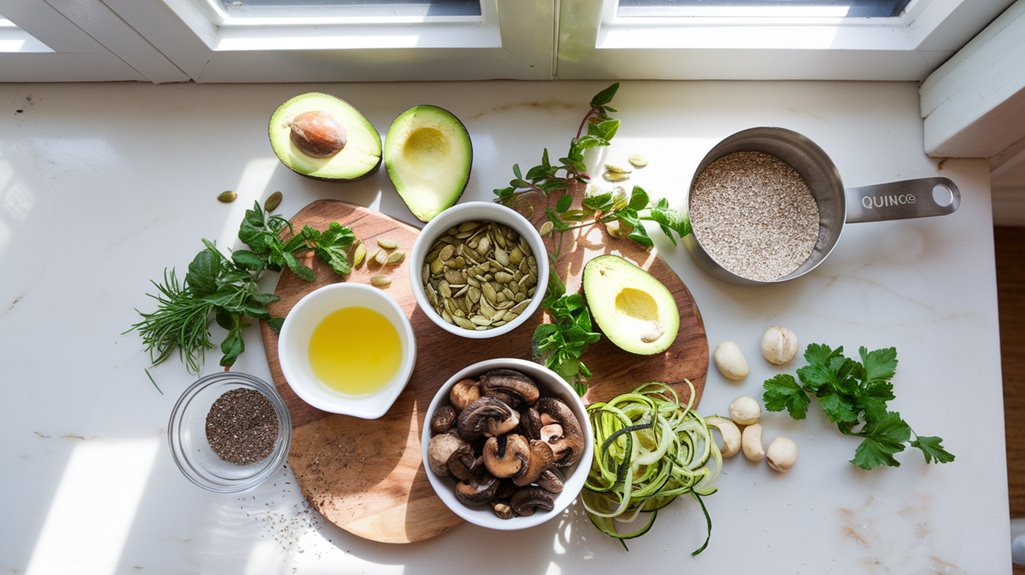
Real-world evidence and clinical studies demonstrate compelling results for the vegan ketogenic approach. You'll find documented cases of significant weight loss, including a 50-pound reduction by a vegan keto dieter with bipolar disorder, and research showing plant-based dieters lose 9.3 pounds more than non-plant-based groups.
The benefits extend beyond weight management. You'll experience improved metabolic markers, with studies showing reversal of type 2 diabetes, normalized blood pressure, and better cholesterol profiles. The NIH has confirmed that vegan diets stimulate innate immune responses, while ketogenic states trigger adaptive immunity.
Most importantly, you'll likely notice enhanced mental clarity, increased energy levels, and reduced dependence on caffeine. Many followers report elimination of sugar cravings and improved focus, while perimenopausal women note significant symptom relief.
Frequently Asked Questions
Can I Drink Alcohol While Following a Vegan Keto Diet?
You can consume alcohol on a vegan keto diet, but choose low-carb options like pure spirits or dry wine. Limit yourself to 1-2 drinks, as alcohol temporarily halts ketone production.
How Do I Maintain Proper Electrolyte Balance Without Animal-Based Broths?
Consume coconut water for potassium, add pink Himalayan salt for sodium, blend leafy greens for magnesium, and mix chia seeds in water. You'll also benefit from vegan electrolyte supplements when needed.
Will Combining Keto and Vegan Diets Affect My Athletic Performance?
You'll likely experience initial performance decline during adaptation, but proper nutrient planning can maintain athletic capacity. Focus on adequate plant protein, electrolytes, and B12 supplementation to support training demands.
Are There Specific Cooking Methods That Better Preserve Nutrients in Keto-Vegan Meals?
Studies show steaming retains up to 90% of nutrients. You'll maximize nutrient preservation in your meals by steaming leafy greens and stir-frying with healthy oils for fat-soluble vitamin absorption.
Can Medications Interfere With Achieving Ketosis on a Vegan Diet?
Yes, certain medications can disrupt your ketosis while following a vegan diet. You'll need to watch for insulin-stimulating drugs, corticosteroids, and supplements containing hidden carbs or sugar-based fillers.
Conclusion
You've witnessed how the vegan keto 2.0 approach merges seemingly opposite dietary philosophies into a scientifically-validated framework. While traditional ketosis relies heavily on animal products, this plant-based adaptation demonstrates comparable metabolic benefits through strategic macro-planning. Clinical studies now support that you can achieve nutritional ketosis while adhering to vegan principles, provided you're diligent about protein sources, healthy fats, and micronutrient supplementation.
References
- https://www.healthline.com/nutrition/vegan-keto-diet
- https://www.nih.gov/news-events/news-releases/switching-vegan-or-ketogenic-diet-rapidly-impacts-immune-system
- https://drannacabeca.com/blogs/keto-green-diet/keto-green-vegan-style
- https://www.groovyketo.co.uk/blogs/keto-articles/vegan-keto-diet-the-ultimate-guide
- https://www.medicalnewstoday.com/articles/326729
- https://drwillcole.com/ketotarian/a-one-day-keto-meal-plan-for-vegans-vegetarians-pescatarians-omnivores
- https://www.nowfoods.com/sites/default/files/2021-11/Keto_Diet Style.pdf
- https://www.healthline.com/health-news/vegan-keto-diet-improve-immune-system
- https://www.ruled.me/comprehensive-guide-vegan-ketogenic-diet/
- https://8fit.com/nutrition/vegan-ketogenic-diet-meal-plan-and-grocery-list/
- https://www.mindbodygreen.com/articles/the-vegan-keto-diet-how-to-do-it-what-to-eat-meal-plan
- https://www.doctorkiltz.com/vegan-keto-diet/
- https://www.drberg.com/blog/the-most-important-nutrient-on-a-vegan-keto-eating-plan
- https://www.carbmanager.com/article/ya9dcriaacaa7cp8/keto-2.0-what-you-need-to-know-and-should-you-try
- https://www.pasteur.fr/en/research-journal/news/two-diets-vegan-and-ketogenic-rapidly-impact-immune-system
- https://listonic.com/meal-plans/en/keto-meal-plan-for-vegans
- https://organicpharmer.com/blogs/organic-pharmer-blog/vegan-keto-recipes-a-complete-guide-to-plant-based-keto-diet
- https://www.prevention.com/weight-loss/diets/a30196446/keto-2-0-diet/
- https://www.mccormickfona.com/articles/2020/02/whats-next-after-keto
- https://www.amritahealthfoods.com/blogs/news/plant-based-keto-diet-guide

